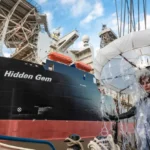Energy News Beat
In a vote earlier this month that attracted cross-party support, Norway’s parliament voted 80-20 to approve a government proposal to open a vast ocean area for commercial-scale deep-sea mining.
It makes the northern European country the first in the world to move forward with the process of extracting minerals from the seabed.
Environmental campaign groups say the approval of an “extremely destructive” process sends a “terrible signal” to the rest of the world.
Norway says its controversial decision to approve deep-sea mining is a necessary step into the unknown that could help to break China and Russia’s rare earths dominance.
In a vote earlier this month that attracted cross-party support, Norway’s parliament voted 80-20 to approve a government proposal to open a vast ocean area for commercial-scale deep-sea mining.
It makes the northern European country the first in the world to move forward with the process of extracting minerals from the seabed.
Norway’s government said the practice could be one way to help facilitate the global transition away from fossil fuels, adding that every country should be exploring ways to sustainably collect metals and minerals at their disposal.
Scientists, however, have warned that the full environmental impacts of deep-sea mining are hard to predict, while environmental campaign groups have slammed the approval of what they call an “extremely destructive” process that sends a “terrible signal” to the rest of the world.
The goal of any exploration activities should be to better understand the scale of the environmental threats deep-sea mining poses — not to justify a practice we know will have vast negative impacts on marine life and the planet’s health.
Essential metals such as cobalt, nickel, copper and manganese can be found in potato-sized nodules on the seafloor. The end-uses of these metals — along with other strategic minerals and rare earth elements — are wide-ranging and include electric vehicle batteries, wind turbines and solar panels.
As a result, demand is growing fast. The IEA expects this trend to continue as the clean energy transition gains pace, noting that demand for cobalt and nickel jumped 70% and 40%, respectively, between 2017 and 2022.
“Today, we are almost dependent on Russia and China and we have to diversify the global supply chain production of minerals around the world,” Norwegian Energy Minister Terje Aasland told CNBC via videoconference.
“We have been looking into the seabed minerals opportunity for a long time. We have a really reliable tradition on how we use the resources in the Norwegian continental shelf. We do it sustainably and we do it step by step.”
As part of the rapid uptick in demand for critical minerals, the IEA has warned that today’s supply falls short of what is needed to transform the energy sector. That’s because there is a relatively high geographical concentration of the production of many energy transition elements.
Most rare earth reserves are located in China, for example, while Vietnam, Brazil and Russia are also major rare earths countries based on reserve volume.
Knowledge gaps
Norway’s parliamentary decision paves the way for companies to apply to mine in its national waters near the Svalbard archipelago. The area, which is part of Norway’s extended seabed shelf, is estimated to be larger than the U.K. at roughly 280,000 square kilometers (108,108 square miles).
Norway’s government does not intend to immediately start drilling for minerals. Instead, companies will need to submit proposals for licenses that will be voted on a case-by-case basis in parliament.
Aasland said the first commercial licenses for exploring the seabed could come “maybe next year” but a license to extract these minerals would likely not happen this decade.
The approval of deep-sea mining puts Norway at odds with both the U.K. and the European Commission, the EU’s executive arm, which have pushed for a temporary ban on environmental concerns.
In response to the criticism, Norway’s Aasland said the vote outcome would help lawmakers better understand whether hunting for minerals on the seafloor can be done in a sustainable way.
“One of the key issues in the debate is we don’t have enough knowledge to decide if we can go to extract these minerals — and I totally agree,” Aasland said.
“We have to collect more information before we can take a decision about extracting these minerals. That is what this opening is all about. It is not the same as approving extraction.”
‘A nail in the coffin’ of Norway’s climate credentials
Anne-Sophie Roux, deep-sea mining Europe lead at the Sustainable Ocean Alliance, said Norway’s decision to greenlight commercial deep-sea mining is “irresponsible” and “puts a nail in the coffin” of the country’s proclaimed role as a climate leader.
“The goal of any exploration activities should be to better understand the scale of the environmental threats deep-sea mining poses — not to justify a practice we know will have vast negative impacts on marine life and the planet’s health,” Roux told CNBC via email.
Marine ecosystems are not well understood. Campaigners fear that exploration and exploitation activities in the deep sea could permanently alter a home that is unique to known — and many as yet unknown — species.
“The argument put forward by the Norwegian government — and the deep-sea mining industry — that ‘deep-sea mining can be done in a sustainable way’ goes against the large consensus of scientific literature,” Roux said.
“There is no way to sustainably mine the deep sea in our current day and age, as it would inevitably lead to ecosystem destruction, species extinction, various sources of pollution and disruption of the climate ecosystemic services of the ocean.”
Maria Varteressian, deputy foreign minister of Norway, said the Nordic country takes its reputation as a sustainable ocean nation “seriously,” however, and this is the case when considering whether seabed minerals could play a role in the energy transition.
“No exploitation activity has started. The main reason to that as you have already said is the huge knowledge gaps which must be filled prior to any activity even being considered. That is important,” Varteressian told CNBC’s “Squawk Box Europe” on Jan. 24.
“Regardless of the views on mining activities onshore and offshore, minerals will be a critical component in the new energy systems so the main question is not whether we need the minerals or not, the important question is can we produce them in a sustainable way?”
ENB Top News
ENB
Energy Dashboard
ENB Podcast
ENB Substack
The post Norway defends deep-sea mining, says it may help to break China and Russia’s rare earths stronghold appeared first on Energy News Beat.








